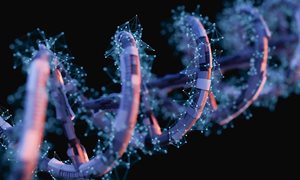Mengfei Cai, Mina A.Jacob, David G.Norris, MarcoDuering, Frank-Erikde Leeuw, Anil M.Tuladhar (2021). Cognition mediates the relation between structural network efficiency and gait in small vessel disease. NeuroImage: Clinical.

In the recently published work in NeuroImage:Clinical, 20 April 2021, from the Department of Neurology, Mengfei Cai and his colleagues investigated the potential mechanisms of gait decline by using data from Radboud University Nijmegen Diffusion Tensor and Magnetic resonance Cohort (RUN DMC) study, a study running from 2006 onwards, at the Radboudumc and Donders Institute for Brain, Cognition and Behaviour. They found that brain network efficiency has a crucial role in gait performance and decline, suggesting gait is a highly cognitive process in the elderly with small vessel disease.
Most older people aged higher than 65 years show signs of cerebral small vessel disease (SVD) on MRI. SVD is recognized as an important cause of stroke and dementia, but its effect on gait impairment is only beginning to be recognized, but incompletely understood. This is important as gait decline in the elderly causes falls and results in loss of independence.
The RUN DMC team found that brain network efficiency was closely related to gait impairment by using quantitative gait parameters, advanced brain imaging analysis, and comprehensive cognitive tests. Interestingly, cognitive functioning mediated the relation between the efficiency of brain network connectivity and gait. These cross-sectional findings paved the way for a follow-up exploration to examine whether brain network communication has a causal role in gait impairment in elderly with SVD.
Publication
Related news items

Five million euro’s for joint research on rare movement disorders
29 March 2022 A Dutch consortium will receive almost 5 million euro’s from NWO to jointly start an ambitious project, called CureQ, on various rare and genetic brain disorders that lead to abnormal movements. Bart van de Warrenburg was one of the main applicants of this ‘Nationale Wetenschaps Agenda (NWA)’ grant. go to page
Development of RNA therapy for rare movement disorder SCA7 Brain Foundation grant for Radboudumc and LUMC
3 February 2022 Neurologist Bart van de Warrenburg, together with Willeke van Roon-Mom and Annemieke Aartsma-Rus (both LUMC/Dutch Center for RNA Therapeutics), has been awarded 400,000 euros by the Dutch Brain Foundation to develop a genetic therapy for the rare hereditary movement disorder SCA7. go to page
Aerobe exercise has a positive effect on brain function in Parkinson's disease patients
18 January 2022 Radboudumc researchers have shown that the brain function of patients with Parkinson's disease improved with regular exercise, which seems to strengthen the connections between different brain areas, while inhibiting brain shrinkage. go to page
New genetic defect links cell biology and protein glycosylation
10 November 2021 Peter Linders, Dirk Lefeber and Geert van den Bogaart together with international colleagues have recently reported on novel cell biological insights, by identifying a genetic disorder in syntaxin-5 which allowed to unravel a new mechanism regulating intracellular transportation. go to page
Impact of COVID-19 pandemic on mental health of Parkinson's patients
10 November 2021 The COVID-19 pandemic has introduced challenges to the social life and care of people with Parkinson’s disease (PD), which could potentially worsen mental health problems. A new study investigated this associaten and explored whether mental health and quality of life can be improved. go to page
